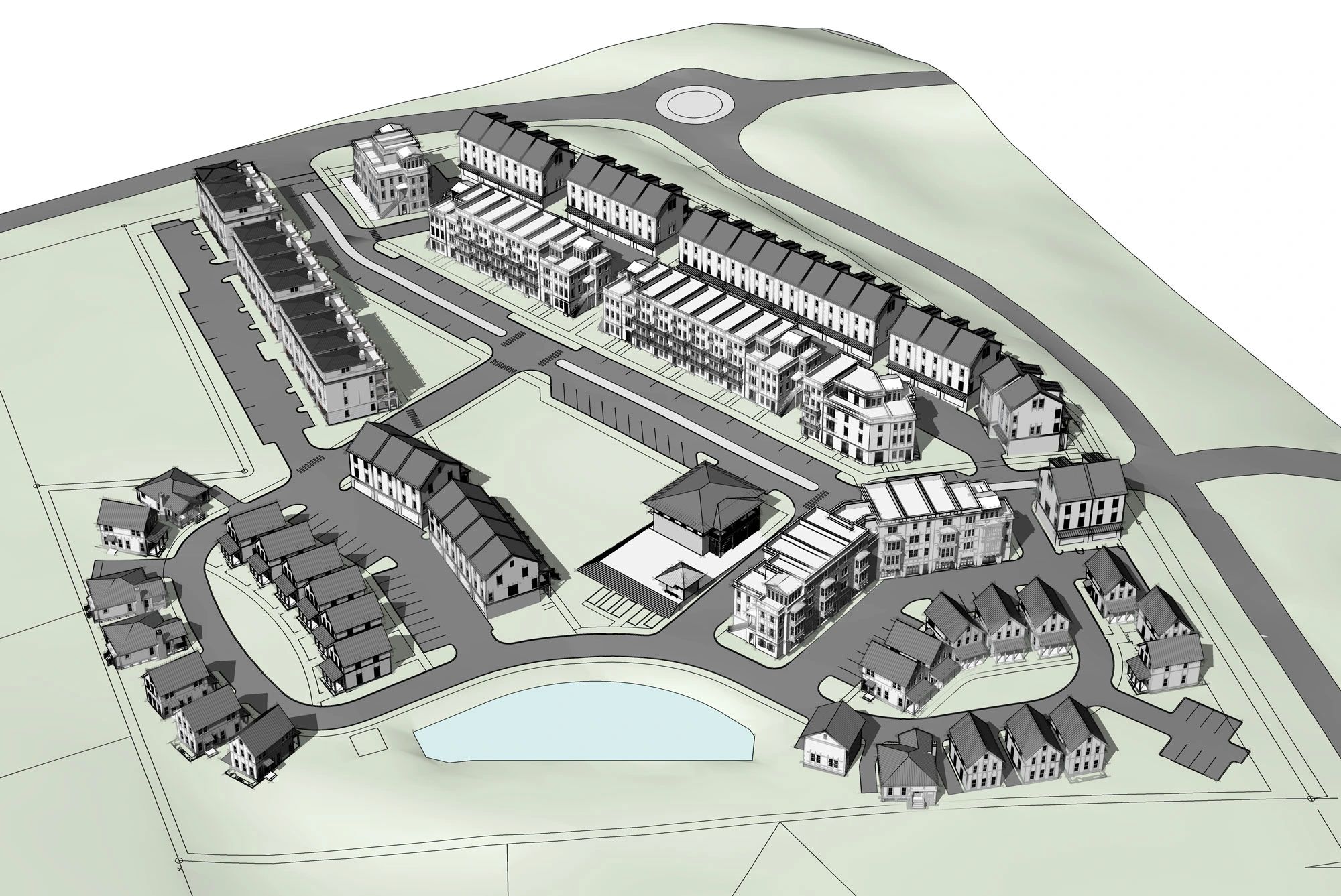The Chapel Hill Town Council held its first work session of 2024 on Wednesday, January 17. Newly elected Mayor Jessica Anderson led the meeting. She was joined by Mayor Pro Tempore Amy Ryan, returning council members Camille Berry, Paris Miller-Foushee, Adam Searing, and Karen Stegman, and newly elected council members Melissa McCullough, Theodore Nollert, and Elizabeth Sharp.
Here are some highlights from the group’s agenda which focused on the town’s Complete Communities Strategy and plan to rewrite the Land Use Management Ordinance (LUMO):
Complete Community Conversation
The Complete Communities Strategy was developed following the 2021 Housing Report and is the guiding document for the Land Use Management Ordinance (LUMO) rewrite, a key agenda item for the town council this year. The strategy outlines where and how to develop housing in Chapel Hill to be inclusive, sustainable, and economically competitive while maintaining the town’s character. Though the Complete Communities Strategy was formally adopted by the town council in December 2022, this will be the first year the council uses the strategy to inform its budget process.
Council Member Sharp spoke on the importance of staff’s transparency with the public on how Complete Communities influences the budget.
“I think it would be helpful,” Sharp said, “for there to be a way for people to understand when a budget is informed by Complete Communities Strategy. What is that? What does that actually look like in the things that are affecting daily life and how is that a positive benefit to our town? Because right now I think people hear a lot of theories and large scale policy, and then they go through their daily lives and they’re like how does this relate, and are you really acting in my best interest. So, I think making the connection in some way between what you do as staff and our ostensibly positive goals for the community would be helpful.”
Though she agreed with Sharp on the importance of communication and outreach with the public, Mayor Anderson also said that this is the first year the town council is including Complete Communities in its budget process.
“I think in terms of your question about the budget, we’re about to find out because we’ve never budgeted with direct lines to Complete Community,” said Anderson, ”so I think what we’re hoping is that as part of our retreat, that’s when we’re going to first start talking about budget in relation to Complete Communities, so it’ll be good to get your feedback for staff and for council to see if that’s resonating or making sense, but we’ve never done that before. So, that just hasn’t been communicated because it didn’t exist.”
LUMO Plan
Staff presented its schedule for adopting a new LUMO. It includes drafting the LUMO between January and May with the input of the community, a consultant team, and the planning commission. Between June and July, the staff expects to refine the draft with the consultant team to share with the council between August and October before having a final draft ready for the council’s vote in November.
Though the council has approved minor updates to the ordinance, including a text amendment last year allowing more housing types to be built in single-family zoned areas, it has not comprehensively updated it since 2003. For the rewrite process, staff emphasized three key goals in fostering community engagement:
- center historically under-engaged voices in land-use decisions
- be responsive to past engagement and community feedback
- educate community members about the planning processes.
Staff also noted its goals to specifically address housing supply, affordability, connectivity to multimodal transportation options, and sustainability. It also laid out its plan to incorporate missing middle housing and identify tradeoffs in certain areas between developing duplexes, triplexes, fourplexes, cottage courts, small apartments, accessory dwelling units, cottages, subdivisions and flag lots.
Following the staff’s presentation, Mayor Pro Tempore Ryan spoke on her desire to see an environmental component added to the staff’s rewrite plan.
“One of the things I don’t see on here,” said Ryan, “is environment. I remember when we first started Complete Community the first thing Jennifer [Keesmaat] put up on the board, was ‘you first decide what you’re preserving.’ And then the rest of it, you decide what you need and you put the intensity that you need in those places. That was kind of the touchstone at first, and I’m not seeing that in here yet, so I think that’s going to be a really important thing to talk about.
Ryan also spoke to the challenge of retrofitting suburban spaces and the importance of planning for different kinds of housing. Council Members Nollert and Miller-Foushee agreed on the importance of expanding the types of housing available in Chapel Hill beyond the scope of just single-family homes. Miller-Foushee stressed the historical importance of this position as it relates to the LUMO rewrite.
“One of the goals of the Fair Housing Act was to address racial discrimination in housing,” said Miller-Foushee, “and one of the get-arounds of that was zoning single-family housing. And so for me, this LUMO rewrite is really an opportunity as a town to signal that we’re not going back to that history, and we’re not going to continue to make it illegal to build anything other than a single-family home. And when you look at the housing types before us, it’s inclusive of families and folks who cannot afford a single-family home.
“I don’t want this conversation to not be contextual about housing rights and the history of housing,” she continued, “and the role that zoning has played in exacerbating racial and class segregation. It’s important that we really keep that front and center when we’re talking about single-family zoning and what that means. And what it means for us to be giving a thumbs up to saying yeah, we’re going to make it legal to build a triplex, or fourplex, cottage, courts, small apartments. Because in this market, that’s what most people can afford. So, again, as Theo was saying, I’m giving a very clear signal to you: yes, let’s move forward.”
Council Member Searing voiced his confusion with the staff’s plan concerning the adoption of the LUMO text amendment last June and general reservation in allowing various types of developments.
“I’m hearing two different things,” said Searing. “One is that we want to expand opportunities, and then you’re saying, well we’re expanding those opportunities in certain areas but not in other areas. So, what I would want to know as we move forward, very specifically, what areas we are going to be expanding opportunities [in]? Because obviously, if you’re building right on Martin Luther King [Jr. Boulevard], that’s much different than building in a neighborhood that has exempted itself from a lot of these changes by establishing an HOA.”
“The base question for me,” Searing continued, “is are we talking about changing what’s allowed in areas that were affected by the text amendment?”
Principal Planner Tasmaya Lagoo, who led the staff’s presentation to the council, responded to the question by clarifying that the text amendment was based entirely on zoning districts. Whether HOAs prohibit people from taking advantage of certain sorts of developments is a different matter. He said that the LUMO rewrite allows the council the opportunity to focus more on development in relation to transportation.
“It’s a premise that I don’t agree with,” said Lagoo, “that there are certain parts of town that weren’t impacted by the text amendment. Because the underlying text that impacts the zoning changed and applied everywhere. We’re going to be coming at the question from a very different perspective.”
Via two informal “thumbs-up” votes, the council affirmed that staff should include more context-sensitive standards for existing subdivisions and agreed that flag lots should be explored to promote residential in-fill.
The Chapel Hill Town Council’s next meeting is scheduled for Tuesday, January 24 at 6:00 p.m. To watch the full work session from January 17, click here.
Photo via the Town of Chapel Hill.
Chapelboro.com does not charge subscription fees, and you can directly support our efforts in local journalism here. Want more of what you see on Chapelboro? Let us bring free local news and community information to you by signing up for our biweekly newsletter.









